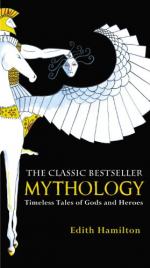|
|
Mythology Part 1, Chapter 2: Two Gods of Earth
Two gods important to the day to day lives of men are Demeter and Dionysius. Demeter is the older divinity because corn and wheat are planted before the grape vine, the gods' earthly manifestations. The grain divinity is a woman because the harvest became a woman's job with the increasing frequency of warfare. Fields and the threshing floor became holy. Demeter's chief festival occurs at harvest time and became known as the Eleusinian Mysteries in Greece. These unknown rituals were held every five years for nine days. Dionysius also came to be worshipped in this ritual. Neither of the Earth gods are truly alive in the winter.
Demeter had a daughter, Persephone, who embodied the spring time. When she walked the earth, spring was eternal. The world began to waste away when Hades stole her. Demeter looked for her for nine days but no one would tell her the truth. The Sun admitted to her that "Persephone was down in the world beneath the earth" Chapter 2, pg. 57. She wandered to the earth until she came to Eleusis. Four virgin sisters found her and took her home for shelter. She asked for barley water flavored with mint. She nursed their brother to give him eternal youth. She exposed herself to the mother, Metaneira, and asked for a temple to be built. Demeter returned when the temple was built and pined for her lost daughter. The world was caught in an eternal winter, and Zeus sent Hermes to make Hades release Persephone. Hades made her eat a pomegranate seed before she left. Persephone rejoined her mother, but Demeter knew that her daughter would soon die from the pomegranate seed, and return to the underworld. Zeus sent his mother Rhea to talk to Hades and make him give up Persephone. Demeter accepted the compromise of Persephone spending part of the year in the land of the dead and a part of the year among the living. This story explains the four seasons.
In the city of Thebes, Zeus fell in love with a woman named Semele. She manipulated him into letting her see his full splendor. The sight killed her. Before she died, Zeus saved their child, Dionysius, and hid him from Hera (his wife). He was cared for by nymphs and nursed by the rain to learn how to culture a vine. Pirates seized him but could not bind him. Only the helmsman guessed that he was a god. The ship filled with wine and dolphins carried Dionysius to safety. He passed through Thrace and went to Crete where he rescued Ariadne from her abandonment on Naxos. He never forgot his mother. He went to the underworld and carried her to Olympus.
Dionysius is known as a kind, but at times, cruel god. He drives Maenads wild with wine. They would rush through towns and forests destroying anything in their way. They have no temples and they worship him in the forest. He went to Thebes to establish his worship officially. Pentheus feared this and told his guards to seize the women. Teiresias warned him, but Pentheus proceeded and Dionysius came before him. All the Maenads escaped.
"Pentheus by now was blind to everything except his anger and his scorn. He spoke roughly to Dionysius, who answered him with entire gentleness, seeming to try to reach his real self and open his eyes to see that he was face to face with divinity." Chapter 2, pg. 70
Dionysius escaped from his chains and asked Pentheus to yield to the divine. Maenads pursued Pentheus into the forest. The Theban women joined them and tore him limb from limb.
Dionysius is simultaneously joyful and brutal. Just as wine can produce joy or sorrow, Dionysius produces ruin and fruit. In his dual nature, he is closer to men than other gods. While Demeter's mysteries were closed, the festival of Dionysius was an open five days of poetry and plays, out of which the most famous of the Greek tragedies and comedies emerged. Just as a grapevine must be cut back and left dead for the winter, Dionysius was believed to be dead in the snow. Every year he submits to the gruesome death of being torn to pieces. His soul, however, lives on and in his resurrection, life overcomes death.




